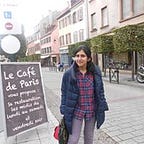Marita Café: A splash of sun for many
One of my dear colleagues Karen took me to a restaurant called Marita Cafe in downtown Oslo yesterday. This café is special because it does not run for money; the purpose of its existence is to provide food to people struggling with drug addiction. The cafe also provides warm clothes donated by volunteers or people who have relation with the place through the church, which also sponsors it’s operations. The tasks for the volunteers include setting up the tables, talk to the guests, listen to them and fetch clothes if they ask for it. The café charges small prices ranging between 5–10 NOK for one meal to visitors who can pay so that they don’t get used to living off free stuff.
The reason I wanted to write about this experience is to keep the spirit of the conversations, that I had with the visitors, alive. It was relatively a quiet evening at the restaurant yesterday, which made it easier to sit down and talk to people personally. Some of them were psychologically unwell and didn’t have clarity in speech which made it hard to interpret what they had to say.
As it goes, the most courageous act is still to think for yourself aloud which means express yourself, express your hopes, your fears, your joys and your dreams; and sometimes the simplicity of expressing yourself by drawing or writing something can be the best ways of communication. The sketches one of the visitors was drawing on his jacket shockingly surprised me. He was sitting in the corner, occasionally blurting a word loudly and then going back to his own little word, which he was visualizing for himself through sketching. A brief smile appeared on his lips times and again and made me think how fragile yet resilient human beings are. In the toughest of the circumstances, people can find a way to bring themselves to smile consciously or unconsciously by going into their own mental “happy world”.
One of the visitors had a heart surgery two months ago. He looked around 60 years old and was scribbling something at the back of a napkin, which I couldn’t understand since it was in Tamil. He was originally from Sri Lanka and talked to me about Muralitharan and Malinga’s deadly bowling attack. I got to know that he didn’t have any drug addiction but visited just to talk to people and get a shelter from freezing weather outside. He said he hasn’t been back to Sri Lanka in 30 years and doesn’t want to visit since there is no family left there. There was a strange sense of aloofness in his aura besides deep calmness while he was carefully cleaning his small bag with some small things probably with some memories attached to them; I guess the bag gave him a sense of belonging in some way.
I met two friends who were barely able to walk and both of them seem to have speech impairment. On hearing closely, I found out that one of them was telling the other one that he was going to drop off his wife at work and then pick up the kids later. I don’t know what accidents he went through in his life that brought him at this point, but the fact that he was still living in the point of his life where his heart felt alive was overwhelming. One thing that made me smile after watching them was that they both looked out for each other. One of them had a spinal cord injury, which hindered him in standing and moving properly. So the other one went to the counter and asked for more sugar for the rice pudding the way his friend wanted it.
“It is impossible to understand addiction without asking what relief a drug addict finds or hopes to find, in the drug or addictive behavior”. By listening to these people, it became clearer how some accidents have the power of changing lives for better or for worse. It was relieving to see that a few people try to help drug addicts one way or another. The first step has to come from themselves though! There are institutions in place that can help (this goes for developed countries) but the victim has to be willing to help themselves too.
